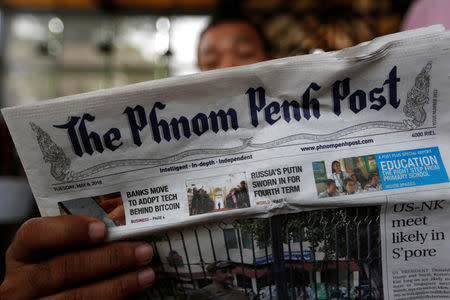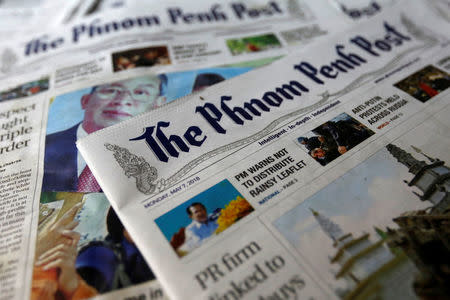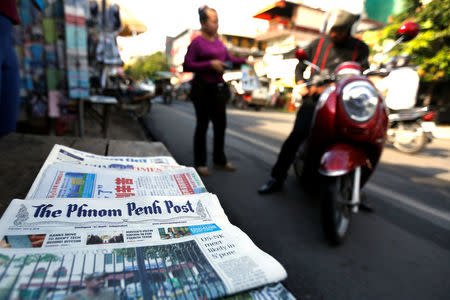Sale of newspaper in Cambodia 'disaster' for media freedom: rights group
By Amy Sawitta Lefevre BANGKOK (Reuters) - The purchase of the Phnom Penh Post by a Malaysian whose public relations firm lists Cambodia's long-serving Prime Minister Hun Sen as a client is a "disaster" for media freedom ahead of a general election, an international rights group said on Monday. In power for 33 years, Hun Sen and his allies have cracked down on perceived critics, opposition politicians, independent media and human rights groups ahead of the July 29 vote. The sale of the English-language daily, which has been largely critical of the government, was announced on Saturday by Australian businessman Bill Clough, who had owned the newspaper since 2008. On Monday, the newspaper's editor-in-chief said he was fired for allowing the publication of an article about the sale, while several staff members said on social media that they had quit. The new owner is Malaysian investor Sivakumar Ganapathy, an executive director at Asia Public Relations Consultants Sdn Bhd, headquartered in Kuala Lumpur. The PR firm's website referred to "Cambodia and Hun Sen's entry into the Government seat" as one of its projects. It also described Ganapathy as leading a team managing "covert operations" for its clients. It did not elaborate. Phil Robertson, deputy Asia director of Human Rights Watch, said the deal was a "disaster for media freedom", telling Reuters that "the only plausible rationale for this acquisition is to blunt the Post's critical coverage of the government." Reuters called Asia PR's headquarters seeking comment, and was told that Ganapathy was not available. In response to an email, his assistant, Krishna Kumaar, said Ganapathy was expected to return in two weeks. Calls to Asia PR's Phnom Penh office were unanswered. "They fired me," the newspaper's editor-in-chief, Kay Kimsong, told Reuters, adding the reason was a report the newspaper published about the sale. "They said that as editor-in-chief I allowed the story about the sale of the Phnom Penh Post to be published." Four other staff members said on Twitter on Monday they had resigned including Brendan O'Byrne, who said the new management had ordered him to remove the online version of the report about the sale of the newspaper. "I refused and offered my resignation, which was accepted," O'Byrne wrote on Twitter. Several sources at the newspaper said there was a protest at its offices later on Monday over the editor-in-chief's firing. The Overseas Press Club of Cambodia (OPCC) voiced its concerns about the sale "to a Malaysian investor whose PR company is connected to Prime Minister Hun Sen". Huy Vannak, undersecretary of state at the Interior Ministry, told Reuters the government welcomed "all investors" to Cambodia. He did not specifically address links between the newspaper's new owner and the government. About 30 radio stations were shut last year and the Cambodia Daily, an English-language newspaper, shut down after it was ordered to pay millions of dollars in back taxes by the government or face closure. In a 2018 press freedom index published by Reporters Without Borders, Cambodia dropped 10 places from 132 to 142. Founded in 1992, the Phnom Penh Post was reportedly slapped with a $5 million tax bill last year, according to reports by the Australian Broadcasting Corporation. In a statement on Saturday, former owner Clough said the tax issue had been resolved, and that the sale was prompted by a "worldwide decline in market share for newspaper advertising" which had also been felt in Cambodia. (Additional reporting by Phnom Penh bureau and Prak Chan Thul; Writing by Amy Sawitta Lefevre; Editing by Simon Cameron-Moore, Robert Birsel)



